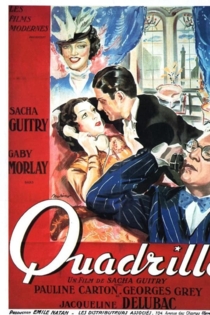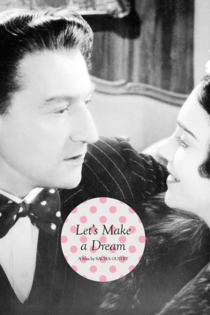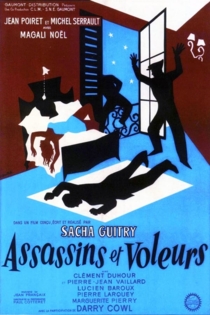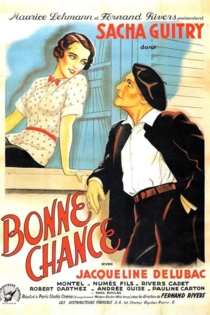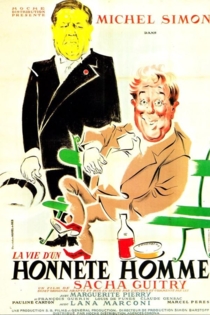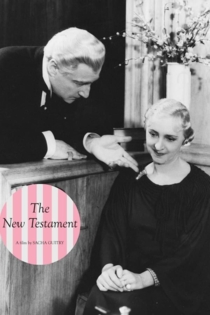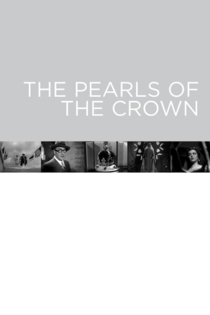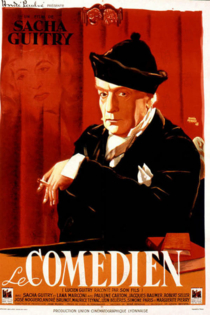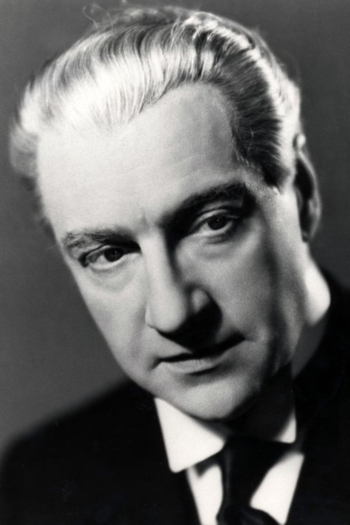
Sacha Guitry
1885 - 1957Guitry's plays range from historical dramas to contemporary light comedies. Some have musical scores, by composers including André Messager and Reynaldo Hahn. When silent films became popular Guitry avoided them, finding the lack of spoken dialogue fatal to dramatic impact. From the 1930s to the end of his life he enthusiastically embraced the cinema, making as many as five films in a single year.
The later years of Guitry's career were overshadowed by accusations of collaborating with the occupying Germans after the capitulation of France in the Second World War. The charges were dismissed, but Guitry, a strongly patriotic man, was disillusioned by the vilification he received from some of his compatriots. By the time of his death, his popular esteem had been restored to the extent that 12,000 people filed past his coffin before his burial in Paris.
Guitry was born at No 12 Nevsky Prospect, Saint Petersburg, Russia, the third son of the French actors Lucien Guitry and his wife Marie-Louise-Renée née Delmas de Pont-Jest (1858–1902). The couple had eloped, in the face of family disapproval, and were married at St Martin in the Fields, London, in 1882. They then moved to the then Russian capital, where Lucien ran the French theatre company, the Théâtre Michel, from 1882 to 1891. The marriage was brief. Guitry senior was a persistent adulterer, and his wife instituted divorce proceedings in 1888. Two of their sons died in infancy (one in 1883 and the other in 1887); the other surviving son, Jean (1884–1920) became an actor and journalist. The family's Russian nurse habitually shortened Alexandre-Pierre's name to the Russian diminutive "Sacha", by which he was known all his life. The young Sacha made his stage debut in his father's company at the age of five.
Lucien Guitry, considered the most distinguished actor in France since Coquelin, was immensely successful, both critically and commercially. When he returned to Paris he lived in a flat in a prestigious spot, overlooking the Place Vendôme and the Rue de la Paix. The young Sacha lived there, and for his schooling he was first sent to the well-known Lycée Janson de Sailly in the fashionable Sixteenth arrondissement. He did not stay long there, and went to a succession of other schools, both secular and religious, before abandoning formal education at the age of sixteen. ...
Source: Article "Sacha Guitry" from Wikipedia in English, licensed under CC-BY-SA 3.0.
Ceux de chez-nous
Sacha Guitry
André Antoine, Sarah Bernhardt
With family connections to some famous French artists, writers, and musicians of the time, Sacha Guitry decided to film the individuals in action, to celebrate the greatness of his culture, threatened by Germany in the ongoing Great War.
Those of Our Land
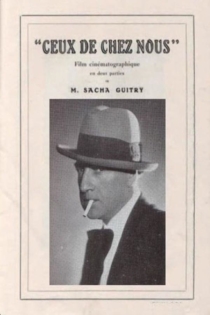
Le roman d'un tricheur
Sacha Guitry
Sacha Guitry, Jacqueline Delubac
Life story of a charming scoundrel, with little dialogue other than the star/director's witty narration. As a boy, only he survives a family tragedy when he's deprived of supper (poisonous mushrooms!) for stealing...concluding that dishonesty pays. Through years of dabbling in crime and amusing adventures, two women appear and reappear in his life, a dazzling blonde jewel thief and a stunning brunette gambler. Finally, he meets the mysterious Charbonnier who had saved his life in World War I, leading to the surprising next phase in his career...
The Story of a Cheat
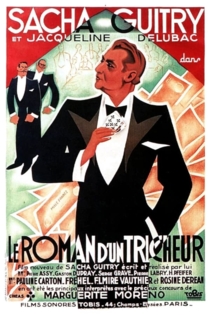
La poison
Sacha Guitry
Michel Simon, Jean Debucourt
Paul Braconnier and his wife Blandine only have one thing in mind: to find a way to kill each other without risk. After listening to a radio show, Paul decides to go to Paris to meet a famous lawyer in the acquittal of the murderers. He tells the lawyer that he killed his wife. The lawyer asks Paul to reconstruct the circumstances of the drama. Without knowing it, he explains, in spite of himself, the way for Paul to murder his wife by putting the odds on his side to avoid death penalty or even be released...
Poison
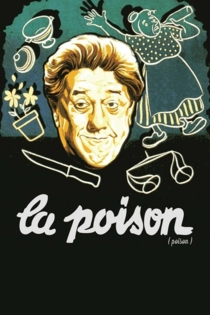
Ils étaient neuf célibataires
Sacha Guitry
Max Dearly, Elvira Popescu
Nine Bachelors is a 1939 French comedy film directed by Sacha Guitry and starring Guitry, Max Dearly and Elvire Popesco.[1] An opportunist dreams up a new scheme to make money when the French government passes a law forbidding foreigners from living in France. It's French title is Ils étaient neuf célibataires.
Nine Bachelors
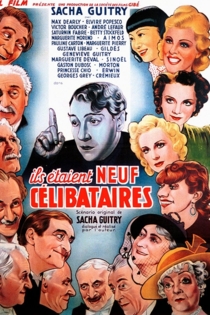
Donne-moi tes yeux
Sacha Guitry
Sacha Guitry, Geneviève Guitry
A renowned sculptor aged about fifty years, François Bressolles falls for the young Catherine Collet whom he convinces without difficulty to pose for him. Complications ensue when he starts to go blind.
My Last Mistress
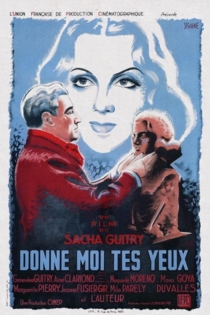
Désiré
Sacha Guitry
Sacha Guitry, Jacqueline Delubac
Sacha Guitry exchanges his usual top hat for a uniform in Désiré, playing a cavalier valet embroiled in an awkward flirtation with his new employer (played by the actor-director's real-life wife, Jacqueline Delubac), who is involved with a stuffy politician. A carefree class farce filled with memorable supporting characters, Désiré blurs the distinction between upstairs and downstairs.
Désiré
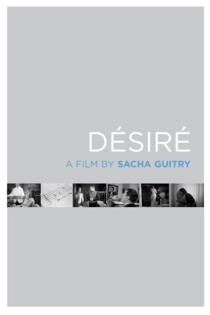
Le Diable boiteux
Sacha Guitry
Sacha Guitry, Lana Marconi
The film is a 125-minute, black-and-white biography of French priest and diplomat Charles Maurice de Talleyrand-Périgord (1754–1838), who served for 50 years under five different French regimes: the Absolute Monarchy, the Revolution, the Consulate, the Empire, and the Constitutional Monarchy. Its title comes from one of the main historical nicknames for Talleyrand, that he shares with demon king Asmodeus and English poet Lord Byron.
The Devil Who Limped
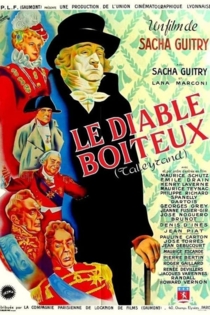
Si Versailles m'était conté
Sacha Guitry
Michel Auclair, Jean-Pierre Aumont
Witty narration follows the history of Versailles Palace; founded by Louis XIII, enlarged by autocratic Louis XIV, whose personal affairs and amours, and those of his two successors, are followed in more detail to the start of the Revolution, after which the story is brought rapidly up to date. A huge cast plays mainly historical persons who appear briefly.
Royal Affairs in Versailles
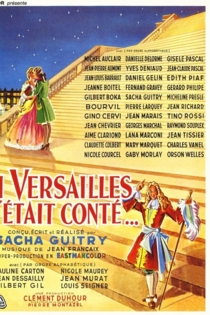
Quadrille
Sacha Guitry
Sacha Guitry, Gaby Morlay
The battle of the sexes as drawing room social satire. Philippe, a middle-aged newspaper editor, has lived for six years with Paulette, a successful stage actress. He tells her friend Claudine, a realistic and enterprising reporter, that he's thinking of proposing. Into the mix steps Carl Erickson, a charming Hollywood matinée idol in Paris briefly. He meets Paulette, sees her act (his box seat compliments of Philippe), and sets out to seduce her. The next two days bring talk, tears, separation, despair, surprises, and, perhaps, reconciliation as characters speak "exactly half the truth." It's a quadrille of changing partners.
Quadrille
